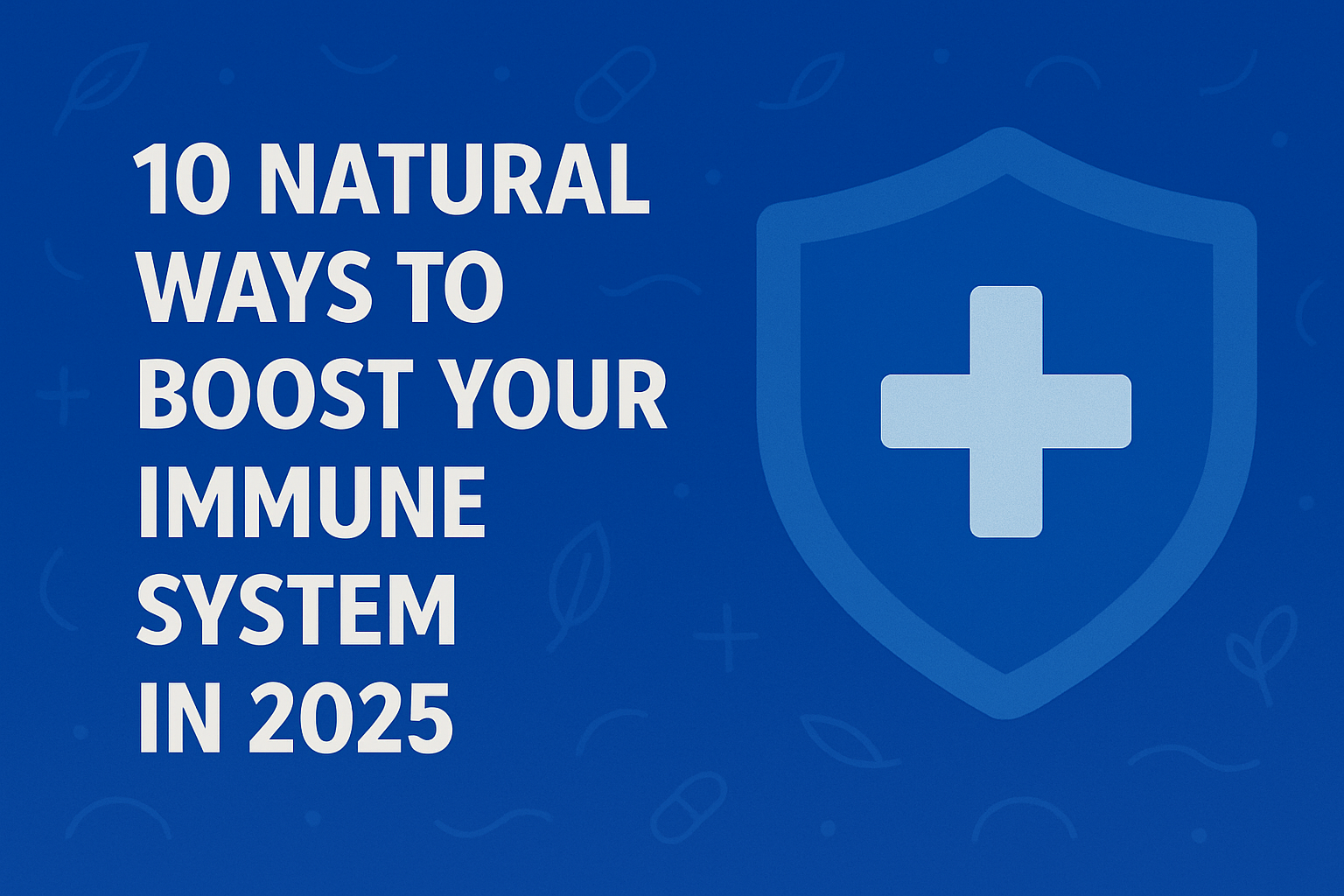Introduction
Your immune system is your body’s defense network. It protects you from viruses, bacteria, and harmful toxins. In 2025, busy lifestyles, processed foods, and rising stress levels can weaken immunity. The good news? You can strengthen your immune system naturally with daily habits.
Real immunity comes from balance: proper nutrition, restful sleep, regular exercise, and stress management. Here are ten science-backed ways to naturally boost your immunity this year.
1. Eat a Variety of Immune-Boosting Foods
Food fuels your immune system. A diverse diet rich in vitamins, minerals, and antioxidants helps your body defend itself effectively.
- Eat at least 5 servings of colorful fruits and vegetables daily.
- Include anti-inflammatory foods like turmeric, ginger, and garlic.
- Choose whole grains for sustained energy.
- Limit processed and sugary foods that weaken immunity.
Example: Add berries to breakfast, spinach to lunch, and roasted garlic to dinner. Small daily steps build long-term immunity.
2. Stay Properly Hydrated
Water supports nutrient transport, flushes toxins, and keeps organs functioning. Mild dehydration can weaken immunity.
- Drink 8–10 glasses of water daily.
- Add lemon or cucumber for flavor and extra nutrients.
- Limit sugary beverages.
- Carry a reusable bottle as a reminder.
Tip: Set phone reminders to drink water throughout the day.
3. Get Enough High-Quality Sleep
Sleep is critical for immune repair. Adults should aim for 7–9 hours of deep, uninterrupted sleep.
- Stick to a regular sleep schedule.
- Limit screens before bedtime.
- Create a calm, dark, and quiet bedroom.
- Use relaxing bedtime routines like reading or light stretching.
Quality sleep strengthens memory, mood, and your body’s defenses.
4. Maintain Healthy Vitamin D Levels
Vitamin D is essential for immune function. Sunlight is the best source, but fatty fish, eggs, and fortified milk help too.
- Get 15–20 minutes of sunlight daily.
- Include vitamin D-rich foods in meals.
- Test levels if unsure and consider supplements if low.
- Consult a doctor before taking supplements.
5. Manage Stress Effectively
Chronic stress increases cortisol, weakening immunity. Manage stress to support your body’s defenses.
- Practice meditation or deep breathing daily.
- Take short breaks from work.
- Spend time in nature.
- Talk to friends or family about your feelings.
6. Practice Balanced Hygiene
Good hygiene prevents infections, but overuse of harsh sanitizers can harm beneficial bacteria.
- Wash hands before meals and after public contact.
- Use sanitizer when soap isn’t available.
- Keep surfaces clean.
- Avoid harsh chemicals on skin daily.
7. Exercise Regularly Without Overdoing It
Moderate exercise boosts blood flow, circulates immune cells, and reduces inflammation. Avoid overtraining.
- Engage in at least 30 minutes of activity daily.
- Mix cardio, stretching, and strength training.
- Take rest days for recovery.
- Listen to your body and avoid overexertion.
8. Support Your Gut Health
A strong gut supports strong immunity. Probiotics and fiber-rich foods maintain healthy gut flora.
- Eat probiotic foods like yogurt, kefir, and fermented vegetables.
- Include prebiotics like garlic, bananas, and oats.
- Consume plenty of vegetables and fiber.
- Limit unnecessary antibiotics.
9. Avoid Smoking and Limit Alcohol
Smoking damages lungs and weakens immunity. Excessive alcohol lowers white blood cells and affects gut health.
- Quit smoking to protect lungs and immunity.
- Limit alcohol consumption.
- Replace alcohol with water or herbal tea.
- Use healthy habits like exercise or hobbies to manage stress instead.
10. Stay Socially Connected
Social bonds reduce stress and support immunity. Isolation can weaken your body’s defenses.
- Spend quality time with friends and family.
- Join social or community groups.
- Make regular phone or video calls.
- Share hobbies or activities with others.
Related Posts
- 10 Daily Habits That Will Change Your Life in 30 Days
- How to Boost Your Mental Health Naturally
- Top 10 Health Trends in 2025 You Shouldn’t Ignore
Frequently Asked Questions (10 FAQs)
1. Which foods are the best for boosting immunity?
Citrus fruits, leafy greens, garlic, ginger, nuts, seeds, yogurt, and fermented foods support immune health.
2. How much water should I drink daily?
Adults should aim for 8–10 glasses of water per day. Adjust based on activity and climate.
3. How many hours of sleep help the immune system?
7–9 hours of quality sleep is recommended. Sleep helps repair the body and maintain immune function.
4. Does exercise always boost immunity?
Moderate exercise strengthens immunity, but excessive or intense workouts without rest can weaken it.
5. Why is Vitamin D important for immunity?
Vitamin D helps immune cells fight pathogens. Sunlight, fatty fish, and fortified foods provide it.
6. How does stress affect immunity?
Chronic stress raises cortisol, suppressing immune responses. Meditation, deep breathing, and breaks reduce stress.
7. Can probiotics really help my immune system?
Yes. Probiotics maintain gut health, which is closely linked to overall immunity.
8. Should I avoid alcohol and smoking entirely?
Quitting smoking and limiting alcohol improves immunity and overall health significantly.
9. How often should I socialize to maintain immunity?
Regular interactions, even virtually, help reduce stress and support your immune system. Aim for daily or several times a week.
10. Can lifestyle changes really prevent illness?
Yes. Consistent habits like proper nutrition, sleep, exercise, and stress management strengthen immunity and reduce infection risk.
Final Thoughts
Boosting your immune system in 2025 is achievable with simple, consistent habits: balanced nutrition, hydration, sleep, exercise, stress management, and social connections. Start gradually, and over time, your body will become more resilient and ready to fight off illnesses naturally.
